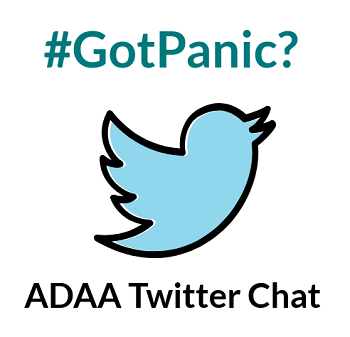The Experts Offer Helpful Tips On All Things Panic
The Experts Offer Helpful Tips On All Things Panic

In honor of Mental Health Month, the Anxiety and Depression Association of America held a Twitter Chat under the title #GotPanic? ADAA members Dr. Debra Kissen @LightOnAnxiety, and Dr. Kevin Chapman @drkchap answered Twitter's questions around symptoms, management & the treatment of panic disorder.
1. What is Agoraphobia and how is it treated?
Dr. Kissen: Agoraphobia is not all or nothing, but instead there are varying degrees from some only feeling comfortable in their home city, to others only feeling comfortable when at home. When you start avoiding certain activities for fear of anxiety, you are in Agoraphobia territory. They key to moving past agoraphobia is not letting anxiety call the shots and decide where you can go and what you can do. YOU are in charge of your life, not anxiety.
Dr. Chapman: Agoraphobia is anxiety about places or situations where escape may be difficult or embarrassing in the event of having a panic attack. Ex: driving, crowds, waiting in line, enclosed spaces, theaters, bridges. Exposure therapy is essential part of CBT Works.
2. What is the relationship between anxiety and panic?
Dr. Kissen: The relationship between anxiety and panic is bi-directional. The more one tries to avoid feeling panic sensations, the more anxiety one feels which only leads to more panic. One can feel stuck in a vicious cycle of anxiety and panic.
Dr. Chapman: I often like to say that anxiety primes the pump for panic. Decreasing the downward spiral of anxiety is an antidote to eliminating panic. This relationship is best explained during psycho-education phase of CBT.
3. Do panic attacks really occur “out of the blue"?
Dr. Kissen: A panic attack may feel out of the blue. Sometimes the brain stumbles upon a threat trigger or false alarm outside of ones awareness. In other words the brain thinks you are about to be eaten by a lion but your front rational brain realizes there is no lion.
For example as I race to answer questions on this chat I have physical sensations similar to panic: rapid breathing, increase in heart rate, etc., but I realize these sensations are associated with this experience. Therefore, I am not interpreting feelings as dangerous
Dr. Chapman: Dr. Kissen nailed this one. Nope. “Subtle” thoughts related to anxiety and shifts in physiological arousal that prime the pump for panic creates a “false alarm” of danger when no danger exists. Similar to pulling a fire alarm with no fire.
4. Should people with panic avoid exercise, caffeine, and other stimulation?
Dr. Kissen: No people experiencing panic disorder should NOT avoid caffeine or exercise or anything else. You need to teach your brain you are strong and can handle an array of sensations.
Dr. Chapman: In the midst of CBTWorks the answer is no. Symptom induction is a critically important treatment CBTWorks component and getting used to the physiological arousal associated with panic is a key in enhancing exposure therapy.
5. Why do I feel like I’m going to pass out when I have a panic attack?
Dr. Kissen: A panic attack is the body in fight/flight mode minus a real threat. When the body is in survival mode it takes in extra oxygen in order to fuel up.
Given there is no “REAL DANGER” this extra oxygen does not get used and can lead to feeling light headed. When having a panic attack a common fear is that one will pass out but actually the opposite is true. A panic attack is associated with increase in blood pressure, passing out is associated with drop in blood pressure. One exception is blood harm phobia.
Dr. Chapman: The core of your body is the most important part in the face of danger. When experiencing fear or panic, adrenaline floods the body into “action” for which blood & oxygen flow to the core, away from other parts, given sensations of “lightheadedness.” You’re good!
6. If there is one tip that you would provide to help get past panic disorder, what would it be?
Dr. Kissen: Love what you are working on in terms of keeping focused on what is most important to you when feeling anxious, and grounding yourself in what you want the moment to be about.
Dr. Chapman: Panic is a “FALSE alarm” that involves uncomfortable but harmless bodily sensations that can be induced by numerous activities, many of which we enjoy (e.g., espresso!) Avoidance increases anxiety about panic & remaining in a situation leads to victory. Put another way, panic symptoms are a sign that our bodies are doing what they should if we are actually in danger, in the case of the fear response. Hence “false alarm” of panic. The difference? With fear, we are paying attention to the threat, not our bodies.
7. What treatment and/or medication is effective for panic disorder and panic attacks?
Dr. Kissen: CBT for panic disorder is treatment of choice. Key element of CBT for panic: interoceptive exposure (learning to play with vs. run from anxiety sensations). Panic disorder is highly treatable so do not lose hope!!
As for medication, be careful of benzo use as it reinforces to your brain that you were truly in danger and keeps panic cycle in play. There is more empirical support for SSRIs for panic.
Dr. Chapman: Cosigning doc here. Naturally. I would simply add the psycho-education piece of teaching clients the relationship between anxiety and panic.
8. My panic attacks make me feel like I'm about to lose control, what can help with these symptoms?
Dr. Kissen: Feeling like you are about to lose control is very different from actually being out of control. Picture a person that you imagine is out of control. Is this because of a feeling they are having, or a behavior they are engaging in? This is just more panic spam mail.
Dr. Chapman: Slow, controlled breathing is a helpful “portable” tool to decrease hyperventilation & to remain in situations. Selecting thoughts in advance is key. Losing control & feeling “out of control” are not the same. Ask yourself: how many times have I lost control?”
9. Will I spend the rest of my life feeling this anxious and awful? Is this my new normal?
Dr. Kissen: There is much caused reason to be hopeful. Panic disorder is one of the most treatable mental health conditions. Find a mental health provider who offers CBT for panic and you will soon obtain relief through hard work and support.
Dr. Chapman: There is hope for anxiety and living constantly anxious doesn’t have to be a new normal though it often feels that way. Please visit adaa.org for numerous resources. Plenty of skilled practitioners that implement structured, effective treatment.
If you related to the symptoms described above, take this Panic Attack and Panic Disorder Symptom Check.
Note – information provided is intended for informational purposes only.












